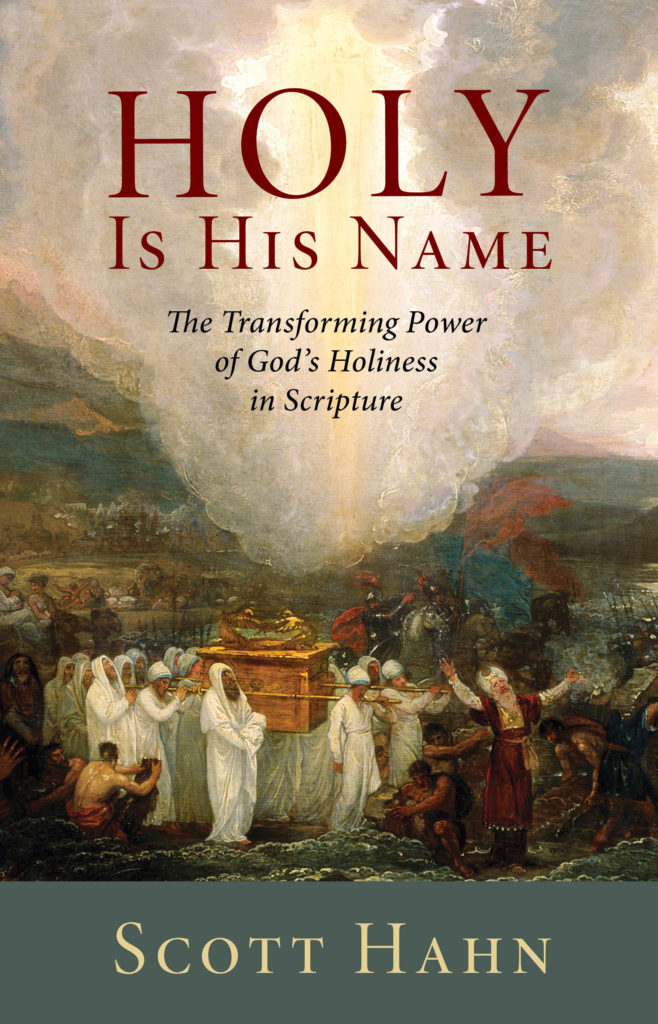
"Covenant” is the word we use to describe the relationship of God with his chosen people since the beginning of time. By observing the Sabbath of creation, God swore an oath and thus established a family bond with human-kind. He renewed this covenant with a series of mediators—Noah, Abraham, Moses, and David—each time drawing his earthly family closer, each time expanding the reach of his mercy.
But then came a strange oracle through the prophet Isaiah. Speaking of some mysterious “servant” of the Lord, the prophet twice utters the line, “I have given you as a covenant” (Isaiah 42:6; 49:8). It’s an odd statement, and it doesn’t seem to make sense. We might expect the Lord to say, “I have made with you a covenant,” or, “I have given you to be a covenant mediator.” But the simple identification of a person with a covenant (and vice versa) is unprecedented. We would never say that Moses or David were covenants, though each served as a covenant mediator. So Isaiah is setting us up to expect something different—something in continuity with the past, because it is a covenant, but at the same time something astonishingly new. The oracle was fulfilled in Jesus Christ. In a sense, Christ is a covenant mediator, recognizably continuous with Noah, Abraham, Moses, and David. Yet he is more. He is something that none of the earlier mediators could ever be. He is the covenant toward which all the former covenants were tending.
In Christ, the covenant now extended beyond an elect group and included everyone on earth, both Israelites and those of other nations. In Christ, God appeared as “the Savior of all men” (1 Tim 4:10), for he “desires all men to be saved and to come to the knowledge of the truth” (2:4). Thus those “who once were far off have been brought near in the blood of Christ” (Eph 2:13). It is Jesus's blood that made possible this reconciliation—blood shed upon the cross (see Col 1:20), blood shared in the Eucharist, which he established explicitly as his covenant meal. At the Last Supper he told his Apostles: “This chalice is the new covenant in my blood. Do this, as often as you drink it, in remembrance of me” (1 Cor11:25; see also Luke 22:20).
Through the Eucharist he would accomplish and sustain communion with his saints. Saint Paul asked the rhetorical question, “The cup of blessing which we bless, is it not a participation in the blood of Christ?” (1 Cor 10:16)—to which the only possible Christian answer is “Of course.”
“Participation,” “communion”—these words are the long form for the single reality that dominates Paul’s letters. It is implicit in a single, short preposition: in.
Paul everywhere describes Christ as dwelling within the Church but also within individual Christians (see Rom 8:10; Eph 3:17–19; Col 1:27). He de-scribes the process most memorably in deeply personal terms. “It is no longer I who live,” he says, “but Christ who lives in me; and the life I now live in the flesh I live by faith in the Son of God, who loved me and gave himself for me” (Gal 2:20). God became incarnate so that he could make his dwelling among us (John 1:14). That is a marvel that exceeded all expectations. But Paul makes clear that the truth is more marvelous still. Christ, in fact, lives in us. He lives in believers, and believers live “in Christ.” It is a mutual indwelling. For it is “in Christ” that Christians have been “sanctified”—made holy, made “saints” (1 Cor 1:2). In Christ “shall all be made alive” (1 Cor 15:22), as surely as they had died “in Adam.” Christians must consider themselves “dead to sin and alive to God in Christ Jesus” (Rom 6:11). “For the wages of sin is death, but the free gift of God is eternal life in Christ Jesus” (Rom 6:23, emphasis added).
“In Christ,” Christians are inseparable from God’s love (Rom 8:39). “There is... no condemnation for those who are in Christ” (8:1). There is, moreover, nothing to separate any peoples on earth from one another. For “in Christ” all are one: “There is neither Jew nor Greek, there is neither slave nor free, there is neither male nor female” (Gal 3:28). When Paul himself speaks, he speaks “in Christ”(2 Cor 2:17). And all those who are “in Christ” share the “mind of Christ” (Phil 2:5; 1 Cor 2:16). These are extraordinary privileges enjoyed through the New Covenant. Those who had been far off have indeed drawn near. And how near are they? So near that they now live “in Christ” and Christ lives in them. This is the new relationship brought about by the New Covenant.
It recapitulates the earlier stages of God’s dealings with man—creation, exodus, and kingdom. For “if anyone is in Christ, he is a new creation” (2 Cor 5:17). Christ is “our paschal lamb” (1 Cor 5:7). In Christ we have been sanctified so that we may inherit the kingdom not merely of David but of God (1 Cor 6:9–11). In the old order, God’s covenant people came to dwell in an earthly land of promise. In the new order, however, believers would come to “sit with [God] in the heavenly places in Christ Jesus” (Eph 2:6). The New Covenant brought all this about by establishing the closest possible family bond between God and man. Scripture compares it to marriage and to the bond between a parent and a child. But it is even closer than that. Mutual indwelling is a relationship previously known only to God.
In Saint John’s Gospel, Jesus repeatedly exhorted people to live “in” him: Abide in me, and I in you. As the branch cannot bear fruit by itself, unless it abides in the vine, neither can you, unless you abide in me. I am the vine, you are the branches. He who abides in me, and I in him, he it is that bears much fruit, for apart from me you can do nothing. (John 15:4–10).
In this instance he used the metaphor of vine and branch to illustrate the principle of mutual indwelling. But he more often favored another analogy. He more often compared his communion-with-believers to his communion-
with-the-Father. He prayed, for example, “that they may all be one; even as you, Father, are in me, and I in you, that they also may be in us, so that the world may believe that you have sent me” (John 17:21). He promised his disciples that one day “you will know that I am in my Father, and you in me, and I in you” (14:20).
The primary relationship, then, is the communion Jesus shares with the Father (see John 10:38; 14:10). But he clearly invited his disciples to enter this relationship through their union with Jesus. The sacraments were the means by which this would be accomplished. Jesus made this clear in his Bread of Life Discourse: “He who eats my flesh and drinks my blood abides in me, and I in him” (6:56).
This sacramental union is something essential—not incidental—to salvation. Jesus said: “unless you eat the flesh of the Son of man and drink his blood, you have no life in you” (John 6:53). This corresponds, furthermore, with what we find in the letters of Saint Paul, who contrasted those who live “in Christ” with those who die “in Adam.” In John’s Gospel, Jesus confirms this shocking terms: “If a man does not abide in me, he is cast forth as a branch and withers; and the branches are gathered, thrown into the fire and burned” (15:6).
Scott Hahn is the Fr. Michael Scanlan Professor of Biblical Theology at the Franciscan University ofSteubenville, where he has taught since 1990. Founder and President of the St. Paul Center, Dr. Hahn hasbeen married to Kimberly since 1979; they have six children and twenty-one grandchildren. The author andeditor of over forty popular and academic books, Dr. Hahn’s works include best-selling titlesRome SweetHome,The Lamb’s Supper, Answering the New Atheism, Understanding Our Father, Scripture Matters, Spirit andLife, The Creed, It Is Right and Just,andHope to Die.Holy Is His Nameis the thirteenth book Dr. Hahn haspublished with Emmaus Road Publishing.
You Might Also Like
Catholics are taught to prize holiness—to admire it in others and to strive for it in their own lives. But we’re never quite told what holiness is. In Holy Is His Name: The Transforming Power of God’s Holiness in Scripture, Scott Hahn seeks to define the term in order to help us better understand our relationship with holiness. Tracing the meaning of holiness first through the Old Testament and then the New, Hahn masterfully reveals how God gradually transmits his holiness to his people—through creation, right worship, and more—and ultimately transforms them through the sharing of his divine life.


